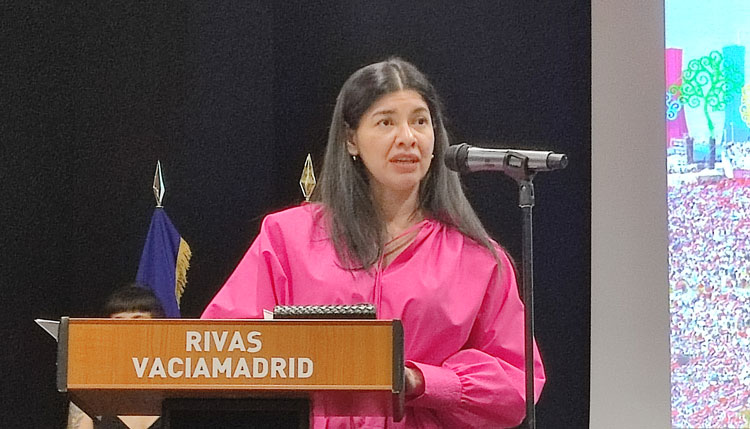Juan David Latorre
The Nicaraguan Embassy celebrated the last Tuesday in the town hall of Rivas Vaciamadrid the 43rd anniversary of the triumph of the Sandinista People’s Revolution. During the event, a solidarity festival of Nicaraguan music and gastronomy was offered.
At the commemoration of “that historic 19 July 1979”, Milagros Urbina, Nicaraguan Chargé d’Affaires ad interim, highlighted, in her words, “the results of the Sandinista Revolution in six points: it radically changed the system twice, when it triumphed in 1979, overthrowing the Somoza dictatorship, and when it defeated neoliberalism in 2006, through the electoral process instituted by the Revolution itself; it instituted and institutionalised a model that responds immediately and securely, leading to structural transformations in all areas; It transferred the concept and practice of power to the citizenry and the segments that had historically been neglected, thus creating popular power in the first stage and citizen power today, which, for the purposes of empowering people’s decision-making capacities, is the same thing; promoted a participatory richness, which has implied the involvement and confluence of popular, democratic, multisectoral and multifactorial participation in the development of events and the consolidation of the revolutionary model; it further ennobled and authenticated the Sandinista Revolution, after an accumulation of struggles, battles and resistance; and finally, it constituted a profoundly democratic system and programme that is based on social justice, the promotion of values and the consolidation of the revolutionary model: On social justice, promotion of values and a culture of Peace.”
“The Sandinista Revolution in Nicaragua,” continued Milagros Urbina, “has equalised opportunities and conditions.” She then highlighted some words of the President of the Central American Bank for Economic Integration regarding the tangible progress in Nicaragua, Dr. Dante Mossi: “I would like to reiterate that Nicaragua has perhaps the largest and best structured programme in all of Central America, things are well executed, the hospitals are really first world class. I would like to point out that in the area of electricity, for example, Nicaragua will be the second country in Central America to reach 100% coverage of its population”.
“My country,” said the Chargé d’Affaires of the Nicaraguan Embassy, “has reduced poverty by more than two digits, ensures education, free and quality health care, housing programmes, citizen security, the essence of good living, a strategic pillar of the Sandinista Revolution. The Nicaraguan model promotes respect for human dignity. It ensures equal opportunities and conditions. It is a humanist, social, solidarity-based, community-based model, profoundly democratic in that it is participatory, living and evolving”.
Milagros Urbina concluded by stating that “Nicaragua has a democracy that is built and becomes effective, in the people / with the people / by the people / for the people and from the people. And this democracy has resulted in tangible changes such as ending the 15 hours of blackouts that Nicaragua suffered daily during the neoliberal era until 2007; reducing poverty from 49% to 19%, extreme poverty from 22% to 6%; its homicide rate is the lowest in the area, making it the safest country in the region; today it has the fifth highest road structure in Latin America and the first in the region; today it has 99.4% electricity coverage, changing the energy matrix in more than 77% of renewable energy production, and finally, the realisation of food sovereignty, with efforts in economic policies to support small farmers and family economies, prioritising women as the head of the family.”
The event was attended by the ambassadors of the Dominican Republic, Guatemala, Cuba, Venezuela and Bolivia, as well as municipal authorities from the town of Rivas Vaciamadrid and representatives of various political parties.








